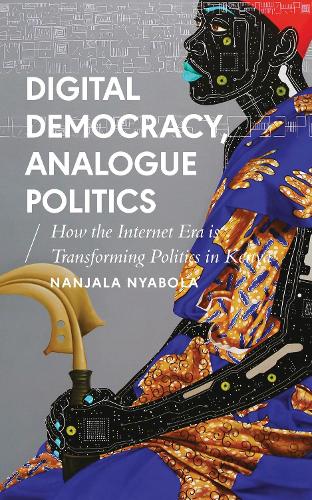
Digital Democracy, Analogue Politics: How the Internet Era is Transforming Politics in Kenya
(Paperback)
Publishing Details
Digital Democracy, Analogue Politics: How the Internet Era is Transforming Politics in Kenya
By (Author) Nanjala Nyabola
Bloomsbury Publishing PLC
Zed Books Ltd
15th November 2018
United Kingdom
Classifications
Tertiary Education
Non Fiction
Media studies: internet, digital media and society
Sociology
Political science and theory
Political structures / systems: democracy
320.96762
Physical Properties
Paperback
304
Width 138mm, Height 216mm, Spine 18mm
384g
Description
From the upheavals of recent national elections to the success of the #MyDressMyChoice feminist movement, digital platforms have already had a dramatic impact on political life in Kenya one of the most electronically advanced countries in Africa. While the impact of the Digital Age on Western politics has been extensively debated, there is still little appreciation of how it has been felt in developing countries such as Kenya, where Twitter, Facebook, WhatsApp and other online platforms are increasingly a part of everyday life. Written by a respected Kenyan activist and researcher at the forefront of political online struggles, this book presents a unique contribution to the debate on digital democracy. For traditionally marginalised groups, particularly women and people with disabilities, digital spaces have allowed Kenyans to build new communities which transcend old ethnic and gender divisions. But the picture is far from wholly positive. Digital Democracy, Analogue Politics explores the drastic efforts being made by elites to contain online activism, as well as how fake news, a failed digital vote-counting system and the incumbent president's recruitment of Cambridge Analytica contributed to tensions around the 2017 elections. Reframing digital democracy from the African perspective, Nyabolas ground-breaking work opens up new ways of understanding our current global online era.
Reviews
Challenges existing scholarship on tech in Africa by exploring how state agency and the politics of offline spaces have consequences for what happens online. This beautifully written book is a must-read for all researchers and journalists writing about Kenya today. * LSE Review of Books *
The book is fascinating. As an added bonus, Digital Democracy is also a highly readable introduction to Kenyan society and politics. * Oxfam Blog *
Digital Democracy delivers a powerful read on politics and social media in Africa. Nyabolas execution and writing are clear and sharp. This well-researched work marshals illustrative stories of social media in Kenya, making it an easy, quick read. * Washington Post *
Incisive, deft, and innovative, this book describes viral trends and critically expands the scholarship on Kenyan politics while bringing the social histories of marginalized Kenyans into sharper focus. * Brenda N. Sanya, Colgate University *
In this highly accessible and timely account, Nyabola moves Kenya and Kenyans from the margins of analysis to the very centre, revealing how local realities help to bring out both the worst and best of the new digital age. * Gabrielle Lynch, University of Warwick *
Anchored in an eloquent grasp of Kenyan history, Nyabola maps the contours of advances, innovations and regressions across Kenyas digital sphere. This is essential reading for understanding contemporary Kenya. * Grace A. Musila, University of the Witwatersrand *
A timely and hugely important work. It chronicles how digital disruption is also an African emancipation, allowing a generation to leapfrog from the so called Third World into the First and into an exciting beyond. * John Githongo, journalist and founder of the Inuka Kenya Trust *
A fascinating and insightful journey into Kenyas digital spaces. It is one of the few studies of social media that goes beyond the digital sphere to provide in-depth social, political, and historic context. * Maggie Dwyer, University of Edinburgh *
Author Bio
Nanjala Nyabola is a Kenyan writer, humanitarian advocate and political analyst currently based in Nairobi, Kenya. Her writing and research focuses on refugee issues and humanitarian interventions, as well as technology and media in Africa. She is a frequent columnist at Foreign Policy, Foreign Affairs, IRIN, New African magazine, Al Jazeera, the Guardian, the BBCs Focus on Africa, the Saturday Nation and other publications.
